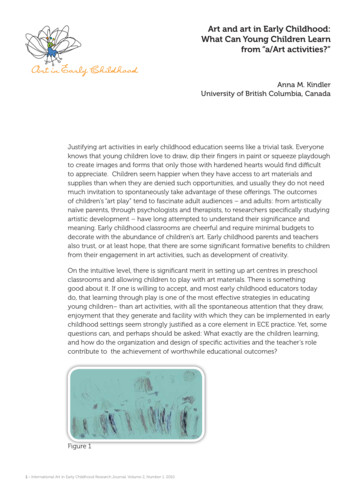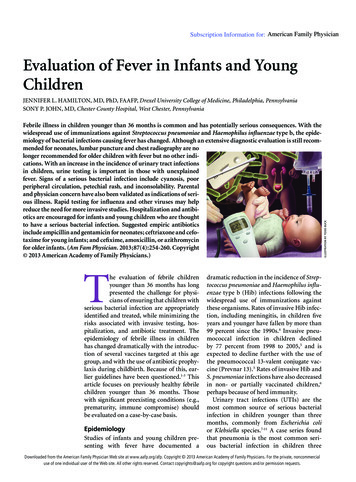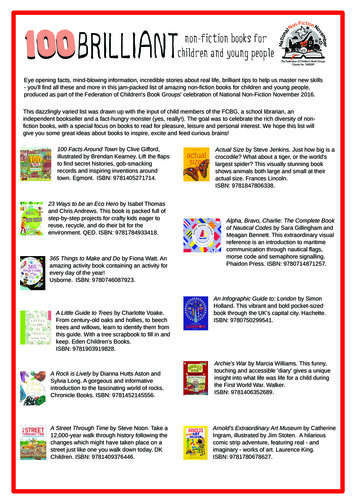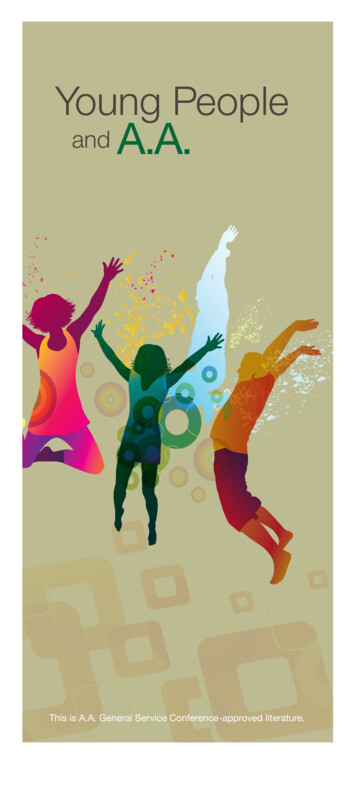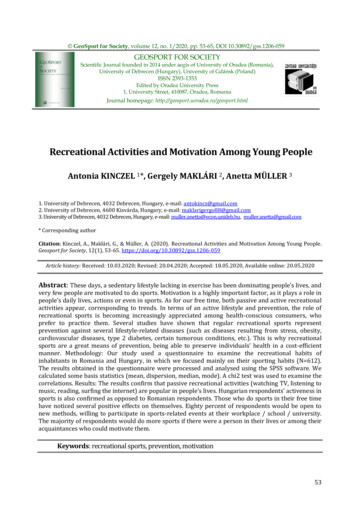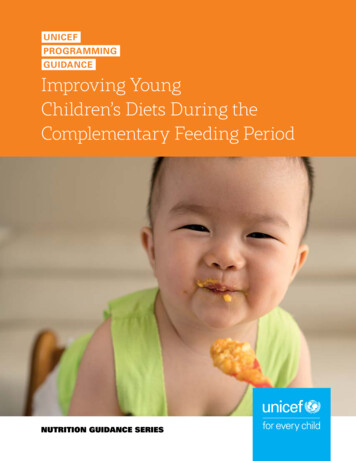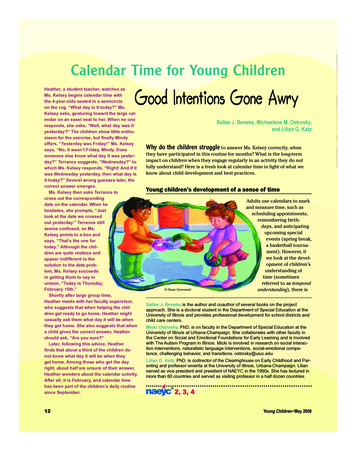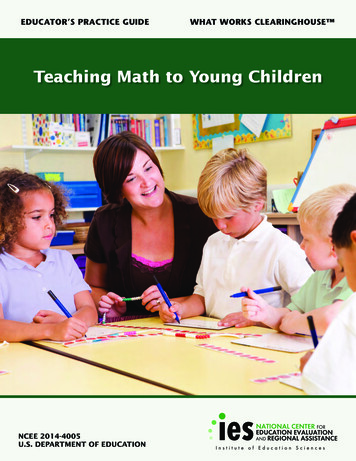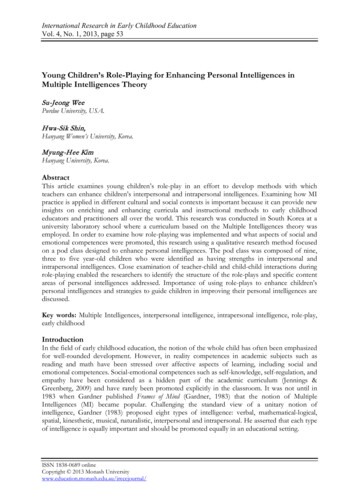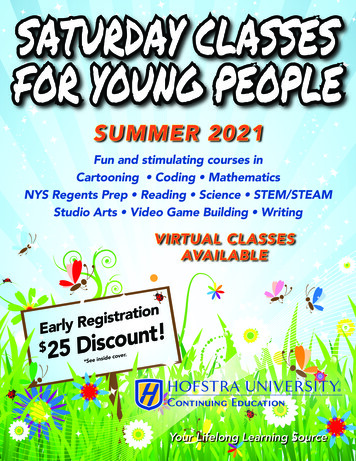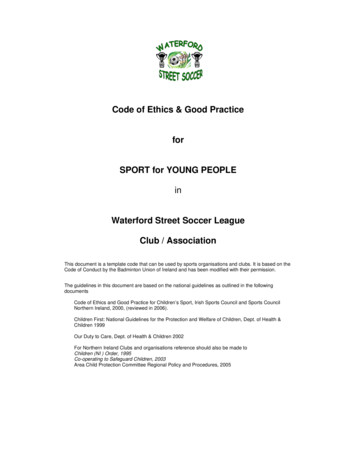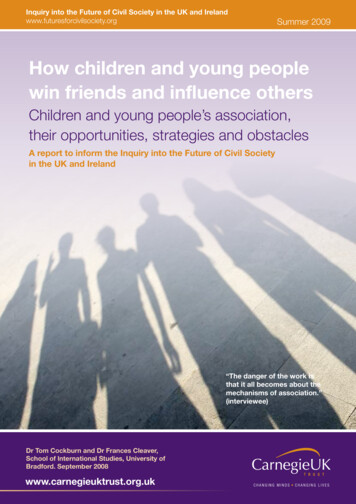
Transcription
Inquiry into the Future of Civil Society in the UK and Irelandwww.futuresforcivilsociety.orgSummer 2009How children and young peoplewin friends and influence othersChildren and young people’s association,their opportunities, strategies and obstaclesA report to inform the Inquiry into the Future of Civil Societyin the UK and Ireland“The danger of the work isthat it all becomes about themechanisms of association.”(interviewee)Dr Tom Cockburn and Dr Frances Cleaver,School of lnternational Studies, University ofBradford. September 2008www.carnegieuktrust.org.uk
How children and young people win friends and influence othersAbout the Carnegie UK Trust Inquiry into the Future of Civil Society in the UK and IrelandThe Inquiry into the Future of Civil Society was established to strengthen civil society. The Inquiry is informedby a Commission, chaired by Geoff Mulgan, and an International Advisory Group.The objectives of the Inquiry are to: Explore the possible threats to and opportunities for the development of a healthy civil society,looking out to 2025; Identify how policy and practice can be enhanced to help strengthen civil society; Enhance the ability of civil society associations to shape the future.Drawing on the findings of the Inquiry’s futures work, the Inquiry Commission decided to explore the currentand possible futures roles of civil society associations in relation to the following themes: Growing a civil economy Social justice and climate change Media ownership, content and social media Dialogue and deliberation Marginalisation of dissentThis report connects with the work that the Inquiry has conducted to explore the relationships betweenchildren, young people and civil society. It therefore complements the findings of the Inquiry’s futures workshopconducted for young people aged 16-21, and a project supported by the Paul Hamlyn Foundation thatengaged children in the Inquiry’s futures work using the arts. Findings from this work are available on theInquiry website.The final report of the Inquiry Commission will be published in early 2010.For further information about the Inquiry and to download related reports go to:www.futuresforcivilsociety.orgPublished by the Carnegie UK Trustwww.carnegieuktrust.org.ukDesign by FalconburyDisclaimer: the Carnegie UK Trust normally does not take institutional positions on public policy issues;the views presented in this publication are those of the author/s and do not necessarily reflect the views ofthe Trust (its officers, staff, trustees) or the views of the Commissioners or the International Advisory Groupaffiliated with the Inquiry into the Future of Civil Society in the UK and Ireland.For further information or to comment on our work please contact us on: 44 (0)1383 721 445 or info@carnegieuk.org.2Carnegie UK Trust
AbstractAbstractHow do young people associate? What is the effect of association on young people’s well-being?The research found the vibrancy of young people’s association, which included a wide spectrum ofrelationships ranging from close friendships to formal participation in public decision-making fora.The outcomes of association can be tracked by looking at various dimensions of well-being; theseinclude the effective exercise of voice, social inclusion, emotional and physical/economic well-being.However, inequitable societal structures play a crucial part in shaping the processes of associationand their outcomes. In effect, such inequalities are reproduced in these associations and perpetuatedin their outcomes.This report explores how young people associate, formally and informally, and what the effect of thisassociation has on their well-being. The research finds that existing social inequalities shape boththe processes of association and engagement, and the outcomes. Even the most resourceful youngpeople struggle to engage as a result of barriers and obstacles being too high.BackgroundThis research was commissioned by the Carnegie UK Trust to inform the Inquiry into the Future of CivilSociety in the UK and Ireland. Through the Carnegie Young People Initiative (CYPI), the Carnegie UKTrust has been working with young people for over a decade. Given the focus of CYPI was to increasethe influence children and young people have over decisions that affect them, it was imperative for theInquiry into the Future of Civil Society to actively explore the relationship between young people andcivil society.This report is one of three strands of the Inquiry’s work that have addressed the relationship betweenyoung people and civil society.The final report of the Inquiry Commission will be published in early 2010.Summer 20093
How children and young people win friends and influence othersContents4. How societal resources shapeassociation17AbstractBackground41. Introduction 5Background to the report5Association6Well-being6Social capital72. Conceptual framework andmethodology8Conceptual framework8Methodology: Entering children’s worlds9Civil society associations andsocial exclusion17Barriers to formal association17Association, participation and space195. Social capital andassociational mechanisms21Young people’s association21Volunteering: formal and informal –the full picture21Family, friends and bonding relationships23Peer networks: bonding,belonging, bullying23Gangs: the dark side of association?243. Well-being outcomes10Trends and indicators of well-being10New forms of association: informationWell-being, wealth and poverty10and communication technologies25Association and well-being10Space, play and attachment to place11Arenas for public deliberationand participation26Voice and processes of association12Public participation and well-being26Expression13Children and representational structures27Struggle to be heard13Children and citizenship education28Dialogue15Wider citizenship education29Adult-child relationships and association30Mirroring adult structures30Adult association31Child protection31Role models31Adults learing from ie UK Trust
1IntroductionIntroductionBackground to the reportThere has been a dramatic intensification of interest in children and young people’s well-being in the last tenyears, but the positive outcomes of this are debatable. A number of important initiatives have shaped policy inthe UK (see Table 1 in Appendix). Most of these aim to extend rights or services to children and young people.However, recent commentary also suggests the poor comparative record of the UK in securing children’swell-being, the lack of systematic monitoring of well-being and the magnitude of the changes in societyneeded to better this position (UNICEF 2007, UK Children’s Commissioners, 2008). Whilst a substantialamount of attention has focussed on economic and health status, education and childcare, there is lessevidence available on the role that life skills, social skills and participation in decision-making, volunteeringand community service play in children’s and young people’s well-being (Bradshaw and Mayhew, 2005). Thisreport aims to outline some of the links between these different elements of well-being in order to create a lensthrough which to examine the associational lives of children and young people.Academic literature links the subject of children’s association to a range of inter-related issues. There is anincreasing interest in the UK in issues of ‘active citizenship’. While the interest in young people’s citizenshipis an important plank of government policy, as exemplified in the Every Child Matters and Youth Mattersagendas, it is also a central concern of research and policy in the voluntary sector. This has involvedcontributions from organisations such as Changemakers, Community Action Network, Youthbank and theCarnegie UK Trust, amongst many others. Useful research has been undertaken in this area by the NationalFoundation for Educational Research (NFER, 2007) and a plethora of other academic studies. The turntowards active citizenship is both informed and tempered by ideas about the extent to which young peopletrust decision-makers and politicians. One study found that those under 25 had the lowest levels of trust ofthose around them and of police and politicians than any other age group (Pattie et al, 2004).Other notable lines of enquiry have explored how adults working with children can help them in communitydecision-making (Save the Children, 2005); the development of standards to ensure consistent high quality ofparticipation (Save the Children, 2005); the use of information and communication technologies in connectingyoung people with democratic processes (Howland and Bethel, 2002; Cockburn, 2005); and how to evaluateand research into children and young people’s participation and decision-making (Kirby and Bryson, 2002).Interest in the inclusion of children and young people in society is also addressed at international level, notablyby the UN. Additionally, the European Commission published its White Paper on Governance and the pathtowards promoting active citizenship of young people by implementing the European Youth Pact (EuropeanCommission, 2005). A European policy review (Mockre and Puntscher Reikman, 2006) argued that newforms of governance are necessary to improve decision-making in organisations. Such governance includesstakeholders (consisting of various networks of public and private agents). These new networks need to linkto decision-making mechanisms that are to replace existing ‘top-down’ politics. The review concludes byhighlighting the importance of developing young people’s identity around democracy and inclusion and thepotential dangers of some forms of democracy to exclude people. There is general recognition of the need tomake deliberate efforts to overcome exclusion from decision-making. More recently, the representatives of thegovernments of the Member States adopted council conclusions for an “approach to youth policy with a viewto enabling young people to fulfil their potential and participate actively in society” (Council of Europe, 2007).The Commission invited member states to “further implement the structured dialogue with young people andyouth organisations ensuring that young people with fewer opportunities and those that are not members ofan organisation are included in the structured dialogue”. Although the Council of Europe conclusions are notlegally binding on EU members, they are viewed as the common opinion of governments.Summer 20095
How children and young people win friends and influence othersWhilst public involvement as an active citizen may be important in terms of making a positive contribution tosociety, such participation is no magic bullet for achieving well-being. A number of trends and policies mayadversely affect children’s associational life and well-being. For many children in Britain, life chances continueto be restricted by poverty and identity-based discrimination. Numerous education acts restrict the curriculumand add to the stress experienced by children at school. The youth justice legislation (at least ten major billsin the last ten years) links children and young people with trouble and misbehaviour, and further restricts theiropportunities (for example, to play or meet in public places). Critics point to poor treatment of children inEngland – they are deemed criminally responsible at the age of 10, may be locked up in institutions and aresubject to state action with reduced access to legal process (NSPCC, 2005). There are also legal restrictionson the role of children and young people on boards of charities and private companies and what they can doto participate in society.In short, there is ambiguity here. Different models of engaging with children include courting them asactive citizens (whose voices are ‘listened to’ and whose rights and welfare are paramount), educating andinstructing them as passive beings and controlling and disciplining them as potentially anti-social.This report teases out some of these overlapping and contradictory approaches to children’s association andwell-being. It also looks at non-formal association (affecting all children) as well as formal participation in publicfora (involving the few). In doing so, it is hoped that some of the gaps in understandings of the links betweenassociation, well-being and a healthy society will be addressed.A number of concepts have been drawn on to inform the way of thinking about children and young people’sassociation.AssociationThis report emphasises that there is a spectrum of association ranging through private and public life, and thatdifferent forms of association are likely to have both ‘light’ and ‘dark’ sides. Whilst interested in the patterns offormal associational life, we are keen to highlight the ‘missing’ associational activity that makes up the bulk ofcivil society interactions for most children and young people.Well-beingThe concept of well-being provides a promising framework for thinking about children’s association and civilsociety because it links the provision of basic needs with social relatedness, the exercise of meaningful agencyand attainment of enhanced quality of life:“Well-being is a state of being with others, where human needs are met, where one can act meaningfully topursue one’s goals and where one enjoys a satisfactory quality of life.” (WEDC, 2008)Arguments for well-being suggest that the concept (embracing material, relational and psychological wellbeing) allows for a focus on the attainment of positive states (well-being, social inclusion) rather than solelyon the amelioration of negative states (poverty/exclusion). It allows for the study of both states of being andprocesses of association. Here, the concept of social capital is used to categorise these. Well-being outcomesare generated through conscious and sub-conscious participation in social, economic and political processes.Well-being is more than the ‘good life’, it is abo
win friends and influence others Children and young people’s association, their opportunities, strategies and obstacles A report to inform the Inquiry into the Future of Civil Society in the UK and Ireland “The danger of the work is that it all becomes about the mechanisms of association.” (interviewee) About the Carnegie UK Trust Inquiry into the Future of Civil Society in the UK and .
